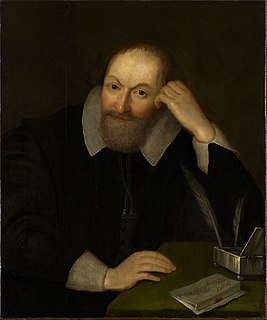A Quote by William Shakespeare
Press not a falling man too far; 'tis virtue:
His faults lie open to the laws; let them,
Not you, correct him.
Related Quotes
Avoid openly trying to reform people. Every man knows he is imperfect, but he doesn't want someone else trying to correct his faults. If you want to improve a person, help him embrace a higher working goal-a standard, an ideal-and he will do his own 'making over' far more effectively than you can do it for him.
The leaves are falling, falling as from way off, as though far gardens withered in the skies; they are falling with denying gestures. And in the nights the heavy earth is falling from all the stars down into loneliness. We all are falling. This hand falls. And look at others: it is in them all. And yet there is one who holds this falling endlessly gently in his hands.
Books lie, he said. God dont lie. No, said the judge. He does not. And these are his words. He held up a chunk of rock. He speaks in stones and trees, the bones of things. The squatters in their rags nodded among themselves and were soon reckoning him correct, this man of learning, in all his speculations, and this the judge encouraged until they were right proselytes of the new order whereupon he laughed at them for fools.
I'll not meddle with it; it is a dangerous thing; it makes a man a coward; a man cannot steal, but it accuseth him; a man cannot swear, but it checks him; a man cannot lie with his neighbor's wife, but it detects him. 'Tis a blushing, shame -faced spirit, that mutinies in a man's bosom ; it fills one full of obstacles; it made me once restore a purse of gold that by chance I found; it beggars any man that keeps it; it is turned out of all towns and cities for a dangerous thing; and every man that means to live well endeavors to trust to himself and live without it.
But Shakespeare one gets acquainted with without knowing how. It is a part of an Englishman's constitution. His thoughts and beauties are so spread abroad that one touches them everywhere; one is intimate with him by instinct. No man of any brain can open at a good part of one of his plays without falling into the flow of his meaning immediately.
They who assert the purest right, and consequently are most dangerous to a corrupt State, commonly have not spent much time accumulating property. The rich man is always sold to the institution which makes him rich. Absolutely speaking, the more money, the less virtue; for money comes between a man and his objects, and obtains them for him; and it was certainly no great virtue to obtain it.





































